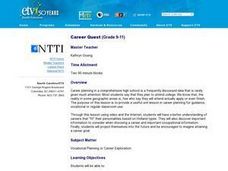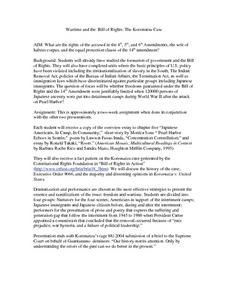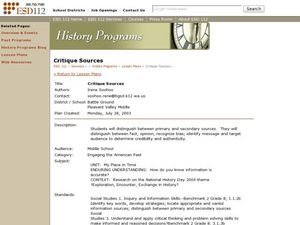Curated OER
Native American Unit
Third graders explore America's history prior to 1492. This unit of six lessons identifies five regions of the United States and assists students in the development of an understanding of the Native Americans who lived in the regions.
Curated OER
Tooling Around Arizona: Reading Arizona Maps
Students research Arizona maps. In this map lesson, students discuss map titles, scales, directions, elevation, and symbols. The class will examine topography, landforms, and rivers found on an Arizona map.
Curated OER
A River Through Time
Learners explore how construction of a dam on the Gila River affected the lifestyle of Pima Indians. In this social studies lesson, students locate the Gila River and the Coolidge Dam. Learners record dates on a timeline and discuss how...
Curated OER
Health Education: Expressing Emotions
Second graders express emotions. For this personal health lesson plan, 2nd graders demonstrate how to express emotions and feelings in a positive manner, without hurting oneself or others.
Curated OER
Take Me to the River
Students learn about a different way of life. In this river and dams lesson plan, students discuss the Hoover Dam. Students then view pictures of the Hoover Dam, discuss the impact of dams, and compare life before and after building a...
Curated OER
Maize to Maquiladoras: Movement from Mexico to Arizona
Fourth graders label maps of Arizona and Mexico to show the people, goods, and ideas that have moved between the two places. In this Arizona and Mexico lesson plan, 4th graders summarize the effects of the movement on Arizona life.
Pennsylvania Department of Education
Pennsylvania’s Energy Supply
Third graders become familiar with the various types of energy and which types are found in Pennsylvania. In this Pennsylvanian energy resources lesson, 3rd graders, identify wind and water as sources of energy. Students complete an...
Pennsylvania Department of Education
Wind and Water Wheels
Students identify wind and water as natural resources that create energy. In this natural resources and energy use lesson, students work in groups to construct a pinwheel, then explore the effects of wind and water on the pinwheel....
Curated OER
Origins: Earth Is Born
Students develop a timeline of all the major events involved in the formation of the Earth and the emergence of humans. In groups, they focus on a specific topic by watching a PBS program and taking notes. After the video, they list...
Curated OER
Career Quest
Help potential job seekers create a personal job options list that "fits" their personality type. They will discover specific occupational information about two chosen careers. Then they will identify the most important factors to keep...
NOAA
Stressed Out!
Are our oceans really suffering due to the choices humans make? The sixth and final installment in the volume of activities challenges research groups to tackle one of six major topics that impact ocean health. After getting to the...
Curated OER
Lesson 5: Publication After the Interview
Students lear about the publishing/writing process such as the outline, rough draft, MLA Guide for listing sources, and evaluating, revising, and proofreading.
Curated OER
Lesson Plan for Day Five Part One of Unit on Bless Me, Ultima
Tenth graders participate in literature circles to discuss the novel, Bless Me, Ultima. They formulate questions based on their reading and answer them in small discussion groups.
Curated OER
The European Union 1
High schoolers view a PowerPoint presentation on the European Union. In this UK lesson, students explore the question of whether the UK should form part of the European Union and develop their debate skills.
Curated OER
Wartime and the Bill of Rights: The Korematsu Case (Lesson 2)
Twelfth graders review how the government and Bill of Rights came into effect. Using primary source documents, they discuss if Japanese rights were violated when they were placed in internment camps after the bombing of Pearl Harbor. ...
Curated OER
Critique Sources
Students distinguish between primary and secondary sources. They study about fact, opinion, and recognize bias. Students find out if information is accurate or not and report on it. For the final project students create an annotated...
Curated OER
Who Ever Heard of the Big Bang?
Learners examine the theories that attempt to explain the origins of the Universe. Some theories are based on scientific facts. Others find their source in folklore. The variety of beliefs systems are discussed as a motivating factor for...
Curated OER
Objective Versus Subjective
Young scholars examine the difference between subjective and objective statements, newscasts, and media. They discover that subjective is opinion based and objective is fact based.
Curated OER
Find the Question
Students look at a group of statements, and pick out the one statement that is actually a question. For this question lesson plan, students eliminate statements as they read.
Curated OER
Speak Out!
Students consider their opinions on various topics and issues related to the terrorist attacks on the United States on September 11, 2001. Then, focusing on one specific topic, each student supports his or her opinions in a...
Curated OER
Genetics
High schoolers investigate public policy regarding genetic research and have formed an educated opinion on what they believe the government role should be.
Curated OER
Structure and Support
Eighth graders read copies of The Declaration of Independence, United States constitution, and the Bill of Rights. They write an opinion about the document they feel is most important in the history of the united states. This is their...
Curated OER
Writing a Letter to the Editor
Students identify the main elements/structure of a letter to the editor. They brainstorm for thoughts and opinions on a specific topic and write a first draft of a letter to an editor of a newspaper. They give each other preliminary...
Curated OER
Culture Clash: New World Meets Old
Sixth graders explore the history of Christopher Columbus. In this World History lesson, 6th graders research facts about Christopher Columbus. Students write their own opinion about Columbus's background focusing on three piecesof...

























